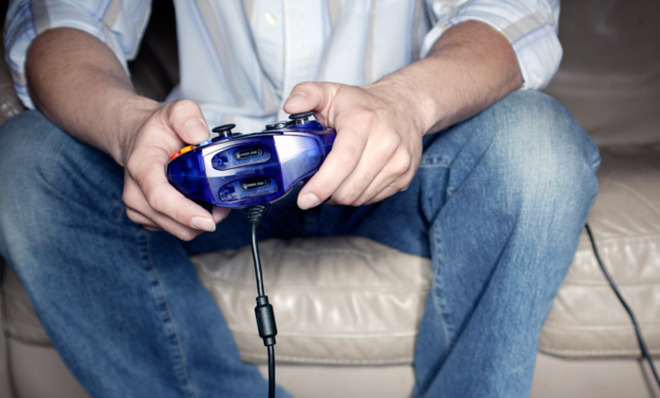What makes games like Flappy Bird so addictive?
Their impact on the brain can be similar to that of drugs

A free daily email with the biggest news stories of the day – and the best features from TheWeek.com
You are now subscribed
Your newsletter sign-up was successful
Flappy Bird creator Nguyen Ha Dong recently announced that he was pulling his game from the App Store and Google Play because it's too addictive.
The frustrating game involves tapping furiously on a device's screen to keep a bird afloat as it passes between green tube-like structures. Because the game is so sensitive to touch, each round usually lasts a few seconds before you reach your inevitable death. People admitted to playing for hours until they could reach their high score — which was usually still in the single digits.
"Flappy Bird was designed to play in a few minutes when you are relaxed," Nguyen said in an interview with Forbes. "But it happened to become an addictive product. I think it has become a problem. To solve that problem, it's best to take down Flappy Bird. It's gone forever."
The Week
Escape your echo chamber. Get the facts behind the news, plus analysis from multiple perspectives.

Sign up for The Week's Free Newsletters
From our morning news briefing to a weekly Good News Newsletter, get the best of The Week delivered directly to your inbox.
From our morning news briefing to a weekly Good News Newsletter, get the best of The Week delivered directly to your inbox.
Can playing video games really be an addiction?
To understand why Flappy Bird and other video games are so addictive, you need to understand the definition of addiction. Psychology Today says it's when people consume a substance or engage in an activity that is extremely pleasurable to them, reaching the point where they only want to do that.
Eventually, it interferes with their everyday life. The person needs more of the substance or activity to stay happy. Without it, they go into withdrawal, a response that can range from physical sickness to irritability.
Biologically — especially with drug addictions — addictive items stimulate the reward center of the brain, flooding it with a neurotransmitter called dopamine that tells your body, "This is good!" You begin to want more of that feeling, which leads to you taking more of the substance or doing more of that activity. That leads to more neurotransmitters being released, and the cycle repeats itself.
A free daily email with the biggest news stories of the day – and the best features from TheWeek.com
How is a game addictive if I'm not injecting or swallowing something?
Behavioral addictions— which involve gaming, gambling, and other repetitive activities — were previously thought to be a weaker form of addiction, but we know now that's not the case.
An April 2013 study presented at the British Neuroscience Association Festival of Neuroscience showed that gambling tends to be a problem for people who also have impulse control problems.
The study also showed that there was a biological basis to behavioral addictions. While both the gamblers and the non-gambling subjects in the study had the same amount of dopamine receptors, the highly addicted gamblers had fewer receptors on average. Drug addicts are known to have fewer receptors as well, indicating they may need something very stimulating to feel good.
Why else makes video games addictive?
Another part of the gambling study looked at gaming qualities like "near-miss" outcomes (when it looks like you are about to win) and the "gambler's fallacy" (the idea that because you have played so much you are bound to win). Brain scans showed that the near-misses activated overlapping areas of the brain that are turned on when you win, meaning people didn't really see themselves as losing as much as almost winning.
NBC News points out that online video games, in particular, have other benefits, including increased social interaction that gets people hooked for long periods of time. This also builds relationships, and gamers feel bad about letting their new friends down.
Video game makers know this — and incorporate these qualities into their games to make them successful.
How do I know if I'm addicted to video games?
The Illinois Institute for Addiction Recovery says that video game addicts are often obsessed with the game. They relive their previous plays and get overly excited thinking about the next time they will play. They can use the game to ignore other problems that are mounting.
They have a hard time cutting down or quitting the game. If they don't play, they get agitated or annoyed.
This may affect their relationships, jobs, and educational aspirations. They may lie to other people to continue playing the game. They could also be more tired during the day, struggle to complete assigned tasks, and see a decline in the quality of their work or schoolwork. Eventually they may cut themselves off from their friends and family to game more.
Michelle Castillo is a freelance writer and editor and a pop culture junkie. Her work has appeared in TIME, the Los Angeles Times and CBS News.
-
 Political cartoons for February 15
Political cartoons for February 15Cartoons Sunday's political cartoons include political ventriloquism, Europe in the middle, and more
-
 The broken water companies failing England and Wales
The broken water companies failing England and WalesExplainer With rising bills, deteriorating river health and a lack of investment, regulators face an uphill battle to stabilise the industry
-
 A thrilling foodie city in northern Japan
A thrilling foodie city in northern JapanThe Week Recommends The food scene here is ‘unspoilt’ and ‘fun’